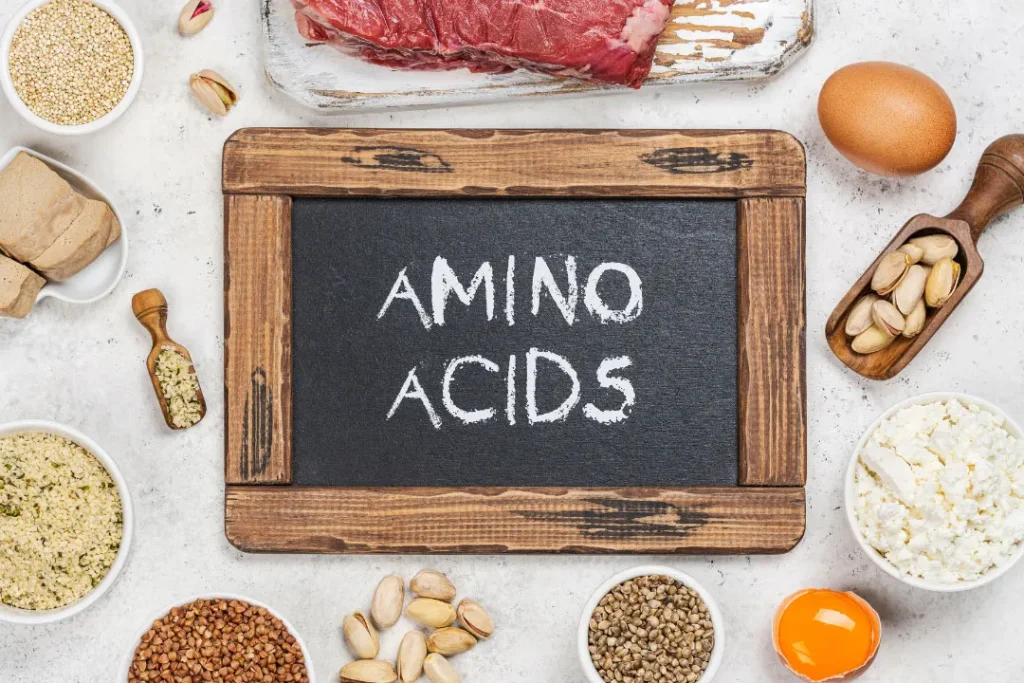Collagen accounts for an enormous percentage of the body’s protein, providing benefits to muscles, skin, bones, and gut health (just to name a few). We’ll discuss the numerous methods of increasing collagen in the body and explore a viable option.
Increasing collagen intake can unlock a world of benefits for your body. Collagen is a powerhouse protein that plays a crucial role in promoting numerous health benefits, allowing for an active lifestyle and better long-term health. Keep reading as we break down several reasons you should consider increasing collagen intake.
You May Also Like:
The Role of L-lysine in Collagen Production: Your Secret to Healthy Skin and Joints
Vitamin B5: Benefits, Dosage, Side Effects, Drug Interactions, And Other Important Information
Why Should You Care About Increasing Your Collagen? is an original (BetterNutritionNews) article.
What is collagen?
Collagen is the most abundant protein in the human body, accounting for about one-third of the total protein content. It is a crucial building block for connective tissues, including skin, bones, tendons, ligaments, and cartilage. Collagen provides these tissues with structural support, strength, and elasticity, contributing to their integrity and functionality.
The benefits of collagen are diverse and significant. In terms of skin health, collagen promotes skin elasticity, firmness, and hydration, helping to reduce the appearance of wrinkles and fine lines. It also plays a role in wound healing and scar formation.
Additionally, collagen is vital for maintaining healthy joints, as it cushions and protects them, improving mobility and reducing joint pain and stiffness. Collagen can also support gut health by helping to preserve the integrity of the gut lining, reducing the risk of leaky gut and digestive issues.
Athletes across the spectrum are embracing collagen for its physical performance benefits. Increasing collagen may contribute to improved muscle growth and strength and increased endurance. Collagen’s contributions to healing make it a valuable tool for improving recovery time after intense exercise and physical exertion. Overall, increasing collagen may contribute to a healthier lifestyle for any individual.

The impact of collagen decline
As we age, the natural production of collagen declines, leading to visible signs of aging, such as wrinkles, sagging skin, and joint discomfort. Lifestyle choices like excessive sun exposure, smoking, and poor nutrition can accelerate this decline. Furthermore, certain medical conditions and chronic illnesses can accelerate collagen degradation. Chronic diseases like diabetes and autoimmune disorders may also impact collagen production.
Collagen decline can impact skin health and cause the skin to lose elasticity, resulting in wrinkles, sagging, and dryness. Joint cartilage weakens, leading to stiffness, discomfort, and reduced mobility. Ligaments and tendons become less resilient, increasing the risk of injuries.
Digestive health may be compromised due to a weakened gut lining. Recognizing and addressing these factors is crucial in maintaining collagen levels. If left unchecked, collagen decline can lead to long-term health and wellness decline.
Fortunately, various ways exist to increase collagen and mitigate the effects of collagen decline. Read on for several methods of increasing collagen that could lead to a healthier lifestyle.
Increasing collagen through collagen-rich foods
Incorporating collagen-rich foods into your diet can help increase your body’s collagen levels. Collagen primarily comprises amino acids, particularly glycine, proline, and hydroxyproline. By consuming collagen-rich foods like bone broth, fish, lean meats, and poultry, your body has the necessary building blocks to support collagen synthesis.
These foods supply the amino acids required for collagen production, ensuring an adequate supply for your body to form new collagen fibers. Additionally, collagen-rich foods often contain other nutrients like vitamin C, zinc, and copper, vital for collagen synthesis and maintaining collagen structure. A healthy diet with collagen-rich foods can help support and increase collagen levels naturally.

Increasing collagen through plant-based foods
Several plant-based foods are great for promoting collagen production and increasing collagen. Some plants, such as soy products, legumes, and tofu, contain compounds that may promote collagen synthesis. Vitamin C is essential for collagen synthesis as it contributes to the formation of collagen molecules. As such, fruits and vegetables high in vitamin C, such as citrus fruits, strawberries, bell peppers, broccoli, and leafy greens, can aid in collagen production.
Even though plant-based sources may not provide collagen directly, they can offer valuable nutrients and compounds that support your own collagen production. Since collagen can only be found in animals or artificially synthesized in bacteria, a well-balanced diet with plant-based and animal-based foods is recommended for increasing collagen. For individuals with animal-based dietary restrictions, consult with your physician for options.

Increasing collagen through supplementation
Another option for increasing collagen is through supplementation. Collagen supplements are typically derived from animal sources, such as bovine or marine collagen. When consumed, these supplements provide an additional source of collagen peptides or amino acids, including glycine, proline, and hydroxyproline, crucial for collagen synthesis. By supplying the body with an external source of collagen, supplementation can help support the production of new collagen fibers. This, in turn, may contribute to improved skin elasticity, joint health, and other collagen-related benefits. Regular collagen supplementation offers a convenient and targeted approach to increasing collagen levels and promoting long-term health and wellness.
Frog Fuel is a viable collagen supplement for individuals looking to increase collagen intake. Its nano-hydrolyzed formula allows for complete digestion in 15 minutes, leading to increased absorption and bioavailability of essential amino acids for improved gut, skin, and bone health, among other collagen-promoting health benefits. In addition, as a fortified collagen protein supplement replete with 22 amino acids, Frog Fuel promotes muscle growth and may accelerate wound recovery to possibly twice the rate.
While Frog Fuel is known for its benefits for athletes, this liquid collagen supplement is for any individual with an active lifestyle who seeks to reap its benefits. Former Navy SEAL and Frog Fuel Co-Founder Alexander Kunz reminds consumers that “Even though Frog Fuel is designed as a high-performance product, it’s suitable for anybody desiring to live an active lifestyle, whether that’s golf, going out on a boat, picking up your grandchild, or wanting to compete at a high-performance level in professional sports, or even wanting to become a Navy SEAL.”

You should care about increasing collagen
The natural decline of collagen in our bodies may lead to physical issues contributing to a compromised lifestyle. Increasing collagen is a great way to maintain your active lifestyle and enjoy better long-term health. Whether enjoying the outdoors or simply trying to keep up with the kids, collagen can provide the benefits your body needs to meet life’s demands.
Further reading:
Harvard School of Public Health: Collagen
Cleveland Clinic: The Best Collagen-Rich Foods
Novant Health: Does collagen live up to the hype? What about supplements?
National Library of Medicine: Collagen Supplements for Aging and Wrinkles: A Paradigm Shift in the Fields of Dermatology and Cosmetics
Tonal: Can Collagen Help Your Muscles Recover and Repair after a Tough Workout?
Important Note: The information contained in this article is for general informational purposes only, and should not be construed as health or medical advice, nor is it intended to diagnose, prevent, treat, or cure any disease or health condition. Before embarking on any diet, fitness regimen, or program of nutritional supplementation, it is advisable to consult your healthcare professional in order to determine its safety and probable efficacy in terms of your individual state of health.
Regarding Nutritional Supplements Or Other Non-Prescription Health Products: If any nutritional supplements or other non-prescription health products are mentioned in the foregoing article, any claims or statements made about them have not been evaluated by the U.S. Food and Drug Administration, and such nutritional supplements or other health products are not intended to diagnose, treat, cure, or prevent any disease.



